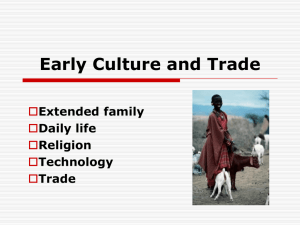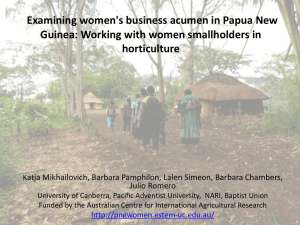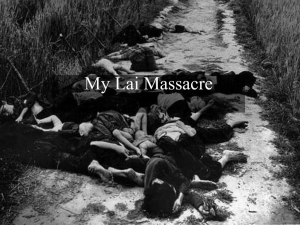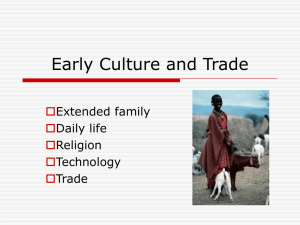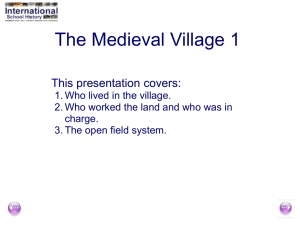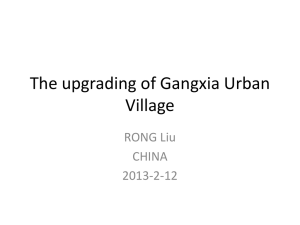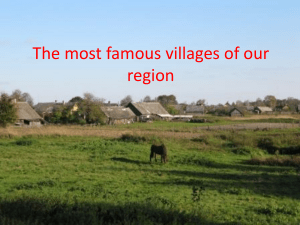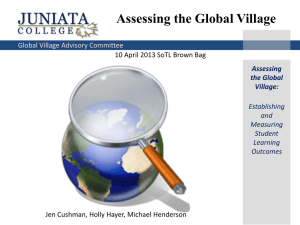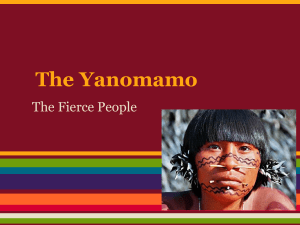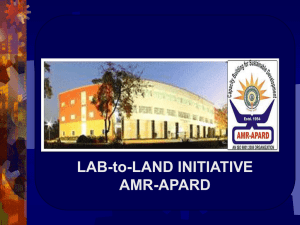A Unique Service-Learning Program: LOHO Village in Sichuan
advertisement
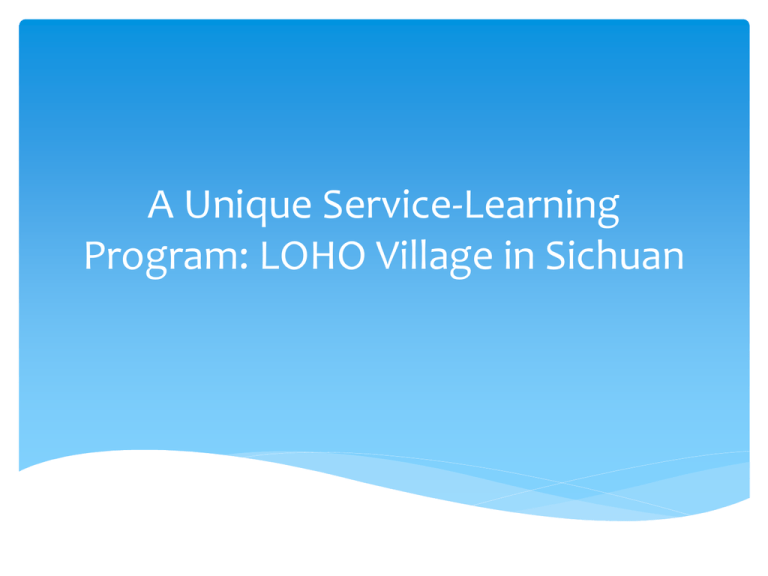
A Unique Service-Learning Program: LOHO Village in Sichuan Introduction of LOHO Village Located in DapingVillage, Pengzhou, Tongji Town with more than three hundred farmers, seated 1,600 meters above sea level. The Global Village of Beijing Funded by “China Red Cross Foundation” and “One Foundation” LOHO: Life Of HarmOny 乐和住宅: 生态人居为主题的低碳环境管理 LOHO Housing: Low-Carbon Environment Management based on the Eco-Housing 乐和生计: 以生态产业为主体的低碳经济发展 LOHO Livehood: Low-Carbon Economic Developments Mainly on Eco-Industry 乐和养生: 以治未病为主导的低碳保健养生 LOHO Health Care: Low-Carbon Health Care mainly on Disease Prevention before It Happens 乐和生态伦理: 以敬天惜物为内涵的低碳伦理教育 LOHO Ecology and Ethics: Low-Carbon Ethics Education based on the thought of "Respect Nature and Cherish Life" 乐和治理: 以互惠共生为特质的低碳社会建制 LOHO Governance: Low-carbon Social Structure Based on the Characteristics of Reciprocity Program Objectives •To experience, study and understand a new model of rural development in Sichuan, China after the earthquake •To Investigate how sustainable development can be implemented towards healthy living, farming agriculture, community industry and Chinese culture in the village •To rethink co-relation between environment, self and community sustainable life through the LOHO Model and daily practice • To learn about Farming, Health, Environmental Protection, Community Management, and Industry Design in the Village. •To learn the “ecological civilization” model through on-site servicelearning and to digest and apply ecological civilization knowledge and spiritual cultural transfer in Hong Kong and your countries. Survey Topics The 2 weeks Service-Learning study tour in Sichuan will cover the following 5 aspects related to the 4 major topics in SLSI or your S-L practicum in HK 1.Farming & Agriculture Study农事农艺研习 (Active Aging) 2.Health Preservation Study 健康及养生研习(Youth Health ) 3.Environmental Consciousness Study环保研习(Waste Management) 4.Community Management Study社区管理研习(All Students) 5.Community Industry Design Study 社区产业设计研习(Social Enterprise) Schedule LOHO (9/7/2011 – 20/7/2011) Talks Daily Practices Field visits and study Tea sharing session(Can Hua Tou參話頭) Chengdu (20/7/2011 – 22/7/2011) Visit community education system TOPIC 1: Farming & Agriculture Study 农事农艺研习 学习内容 Learning Content 1. 农业简史 Agricultural History 2. 种植养殖 Plant breeding 3. 控虫控草 Weed & Pest Control 4. 成本核算 Costing 5. 收获分类 Harvest Category 6. 二十四节气 The seasons (24 solar terms) TOPIC 2:Health Preservation Study 健康及养生研习 学习内容 Learning Content • 易行养生操 Easy Health Exercise • 食物烹饪与身心健康 Cooking and Health • 食物与自然 Food and Nature • 径行与静坐 Village Walk and Meditation • 茶道与吟诵入门 “Chao Dao” philosophy of Tea TOPIC 3: Environmental Consciousness Study环保研习 学习内容 Learning Content • 环保概论 Environmental Studies • • 社区污水处理 Community Sewage treatment 社区能源主题调查 Community Energy Survey • • 社区垃圾分类实践 Community waste separation practice 环保主题茶道会 Environmental Tea Sharing Session TOPIC 4:Community Management Study社区管理研习 学习内容 Learning Content • 小区自治机构成立与运行Establishment and operation of community self-government bodies • 走访村委、乡民、生态协会,了解当地的农村社会结构——乐和治 理 Visit the village committee, villagers, ecological councils, to learn about the rural social structure – Loho Governance TOPIC 5: Community Industry Design Study 社区产业设计研习 学习内容 社区可持续产业设计与分配原则 Sustainable community industry design and distribution 参观及走访产业 Visit community industry design sites Role and Tasks Before the trip: Go through the information in logbook, teaching book and website Design and plan your research topic, questions, schedule and DOL Prepare talent show Prepare home visit materials During the trip: Attend all sessions prepared by the tutor in LOHO Farming dairy Field visit and survey based on your topics Presentation Talent show Daily reflection dairy After the trip: Apply what you have learnt into the S-L practicum and transfer the knowledge to the community Integrate your knowledge for the Report-Back Presentations and other final assignments Assignment and Evaluation Criteria The service-learning in Sichuan will make up 15% of your total SLSI grade* 参与的积极性、动手能力、思考力、创新能力 Active participation, Practical ability, critical thinking & creativity 农事日记 Farming Diary 论文(或相关写作、表达)及汇报 Essay (or related writing and expression) and presentation 5% 5% 5% *Please note that there was a printing mistake in your Sichuan logbook and SLSI student handbook about the grading breakdown! Please update: Total Participation = 25% Sichuan Participant = 15% Practicum Output/Product = 20% Tips for doing survey in Village Topics Group Farming & Agriculture Study农事农艺研习 Active Aging Health Preservation Study 健康及养生研习 Youth Health Environmental Consciousness Study环保研习 Waste Management Community Industry Design Study 社区产业设计 研习 Social Enterprise Other areas that you want to know All students Villager may not feel comfortable to answer questionnaire BUT they love to talking to you At least 1 person familiar with Putonghua in a group Tips for doing survey in Village When you think of your questions, please make sure they: Can enhance your understanding of the topics in HK and Sichuan Benefit your S-L practicum in HK Relate to your overall SLSI research questions Don’t just rely on questions, use your eyes and brain too Your questions could be related to the following aspects: 1. How often they use the facilitation in the village 2. How often they are involve in the community 3. How much they know about LOHO’s works in the village 4. To what extend the villager think LOHO’s work benefits their life 5. How they learn the skill or knowledge from LOHO and how well they practice that in daily life * You might feel free to discuss the questions with Program coordinators! TIPS for a wonderful trip Be open-minded and flexible as things change every day in the village Take the initiative to learn and try, even in new/difficult situations Respect to the villager’s life style and their culture No judgment is need but to explore, understand, feel and learn. Throw your perception, stereotype and modern lifestyle; then it will be a change to refresh your life. Be responsible and considerate to everyone you work with TIPS for a wonderful trip Be patient while facing challenges and be flexible Do not hesitate to ask if you have any questions Have interaction with the mentors: Saya and Yeewen Keep in touch with your group members and fellow participants Set goals for yourself and make sure to achieve them You go to the village is because the villagers are willing to share their experience and wisdom, not because they need your help. Please be a polite and active learner, but not a service provider. Have fun! Last reminders Temperature : 20-30 centigrade Packing list: towels, slippers, electric torch, Toothpaste, toothbrush, Bathing utensils, Toilet paper, Travel adapter plug, Camera and recharger, Mosquito Repellent, sun block, Water Bottle, Comfortable Tees and jackets, regular painkillers for stomachache, flu, headaches, muscle pain, medicine for altitude sickness, etc. Flight Schedules Hong Kong to Chengdu on 9 July (Saturday) Chengdu to Hong Kong on 22 July (Friday) (Sarah, Junyan, Rita + Carol and Jenny) HK-Chengdu KA820 – 10:25-12:55 Chengdu-HK KA1427 16:30-18:45 (Amy, Chloe, Amber and other students) HK-Chengdu CA412 – 11:10-13:45 Chengdu-HK CA427 – 16:30-18:45 Division of Labour Groups: Amber – Active Ageing Yeewen, Saya - Youth Health (Facilitated by Amy and Chloe) Amy – Social Enterprise Chloe – Waste Management Our Mentors Q&A

